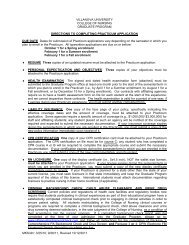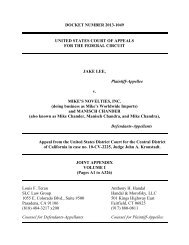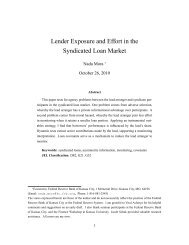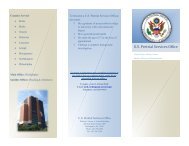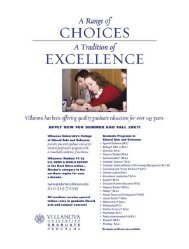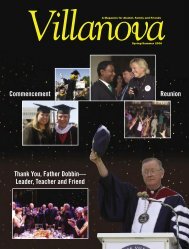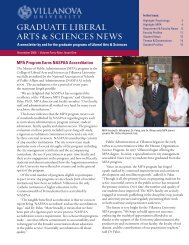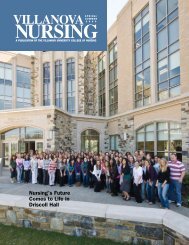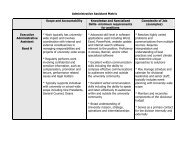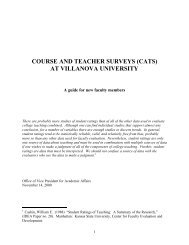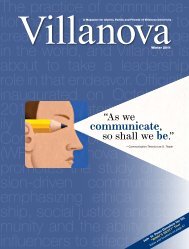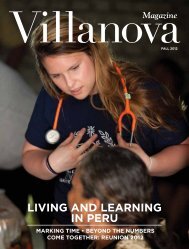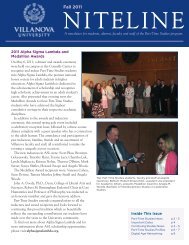Commencement 2007 - Villanova University
Commencement 2007 - Villanova University
Commencement 2007 - Villanova University
- No tags were found...
Create successful ePaper yourself
Turn your PDF publications into a flip-book with our unique Google optimized e-Paper software.
Focus on the College ofLiberal Arts and SciencesFrom The <strong>Villanova</strong>n to a Pulitzer PrizeHer journalism career took root on campus, but it was while knocking ondoors in South Carolina that Diana K. Sugg ’87 A&S discovered a passionfor journalism and a compassionate voice.BY ANTHONY MAALOUF ’08 G.S.Diana K. Sugg ’87 A&S had onlybegun her job as a reporter for theSpartanburg Herald-Journal, a dailynewspaper in South Carolina, when shefound herself right on the cusp of a mysteriousstory. Ultimately, it would lead to a distinguishedcareer in journalism, including aPulitzer Prize for beat reporting in 2003.Speaking to an audience of faculty andstudents, Sugg returned to <strong>Villanova</strong> <strong>University</strong>on March 27 to talk about herexperiences as a student in the College ofLiberal Arts and Sciences (A&S) and theensuing path she took. Her talk markedthe third and final program in a series featuringA&S alumni who spoke about thevalue of a liberal arts and sciences education.The series for first-year students wassponsored by the A&S Office of Advisingand Professional Development.After graduating from <strong>Villanova</strong> withPhi Beta Kappa status and with a dualdegree in Honors and English, Suggworked at the Philadelphia office of theAssociated Press before heading south toSpartanburg. There, she said, she foundher passion for writing when she was onthe job. Reporting on a suburban housefire that killed a mother and daughter,Sugg remained at the scene after mostreporters had left. It was then that sheoverheard police talking about the house’swindows being nailed shut. This made theyoung reporter curious.“I stuck around and knocked on a coupleof doors,” Sugg recalled. Not long aftera few interviews of some willing neighbors,she learned exactly why the windowscouldn’t be opened, and began to uncovera new story. The young woman who diedin the fire, Wanda, suffered from mentalillness. The windows were nailed shutbecause her parents could not get hertreatment and felt that the only way tokeep her safe was to keep her lockedAim high, find a mentor and go overseaswere among the words of wisdom offeredby Diana K. Sugg ’87 A&S to Arts andSciences freshmen.inside. It appeared that her mental illnesswas actually an open secret; the neighborhoodhad dubbed her “wicked Wanda.”“Their situation was representative ofmany others around the country who can’tget the mental health treatment theyneed, due to a lack of insurance coverageand other issues,” Sugg said.She eventually returned to the newspaperoffice and wrote two stories that night.The first was a news story on the fire thatkilled the mother and daughter, but theother was a feature story about a youngwoman in a tough situation who was inneed of help. Her first paragraph of thatone began with “Wicked Wanda, that’swhat they called her…”“I knew it then, that this was for me,”Sugg told the audience. From there, shewent on to become a veteran journalist,JOHN WELSHJOHN WELSHcovering a variety of stories from differentparts of the country. After Spartanburg,she went west and became a crimereporter and then a medical reporter forThe Sacramento Bee. She settled downback east at The Baltimore Sun, where shehas been a leading reporter on the healthbeat for the last 11 years.Along the way, she earned a master’sdegree in journalism on a Kiplinger Fellowshipat The Ohio State <strong>University</strong> in 1992.Immersed in journalism for almost 20years now, Sugg has received numerousawards on the local, state and national levels.She also has seen her work printed incollege textbooks and has interviewed manycelebrities, including the late James Brown.She served on the National Advisory Boardof the Poynter Institute, a school for journalists,and has been a frequent speaker at writingworkshops around the country.As a medical reporter, she also has writtenabout her personal history of healthstruggles. Sugg survived a stroke in 1990and was incorrectly diagnosed with epilepsy.In 1997, she wrote about her experiencesin a piece for The Sun headlined,“What’s Wrong with Me?”Her articles on the health struggles ofother people and their families have madean immense impact. In “Present at lovedone’s last moments” (2002, Baltimore Sun),she gave a moving account about how a hospitalstaff suspended its policies of rushingrelatives out of a patient’s room during resuscitationefforts. Instead, they let a motherbe present with her dying 11-year-old sonin his last moments. Sugg’s writing of theseaccounts of compassion has contributed toan ongoing debate in the medical professionover the presence of close relatives duringmedical emergencies. This feature, alongwith many other of Sugg’s works as a medicalreporter, was submitted in her nominationfor the 2003 Pulitzer Prize.Summer <strong>2007</strong> 53



